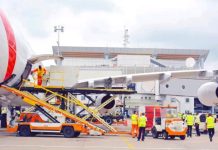The International Air Transport Association (IATA) welcomed the UK Transport Select Committee’s endorsement of Heathrow as the right location to expand airport capacity, but warned that the costs could still spiral out of control. IATA also welcomed the Committee’s recommendations that the government consider giving the Civil Aviation Authority greater powers to regulate Heathrow’s passenger and airline charges, and that these charges be held flat in real terms.
“The airline community supports Heathrow as the right location to expand airport capacity, but has two overriding concerns: affordability, and operational flexibility. Both are jeopardized by the current plans from Heathrow’s owners. The Select Committee’s recommendations on cost control should be essential reading for the government, for Heathrow Airport Holdings Ltd (HAL), and anyone with a stake in the future of air transport in the UK. At the moment, we are looking at extra capacity in the right place, but at the wrong price. We need guarantees regarding how costs will be managed, especially if key risks are not known at this stage,” said Rafael Schvartzman, IATA’s Regional Vice President for Europe.
The Report is clear that Heathrow airport charges are the highest in the world, and that any expansion of the airport must be accompanied by a commitment that charges will not rise from the current level. Such a commitment would be in line with comments from the Secretary of State that charges should stay at today’s levels.
“We welcome the Committee’s recommendation that charges should be held flat. And we share the Committee’s concerns on the effects of an increase in charges. An unaffordable Heathrow will have a detrimental impact on the competitiveness of the UK’s only hub airport in comparison to rivals in France, Germany and Netherlands,” said Schvartzman.
Costs for constructing the new runway could spiral out of control. “HAL have suggested a cost in the region of 14-17 billion pounds to build the third runway—around double the price of the London Olympics. The Select Committee have noted that these estimates are optimistic. And HAL have not been clear on the funding of crucial works such as the proposed bridging of the M25 and the relevant surface access schemes. The only way these concerns can be addressed is to ensure that there is much greater transparency on the costs of construction. Heathrow is a facility that benefits the entire nation – it is too important not to be under careful oversight,” said Schvartzman.
Connectivity under threat
The operational flexibility that enables airlines to provide connections to some of the world’s largest and fastest-growing economies is under threat. In particular, the proposal to instate a ban on flights in the early morning will damage the connectivity of the UK economy. It also weakens the economic case for the new runway.
Airlines are acutely aware of the noise impacts on local communities. The third runway opens up the possibility of predictable and increased noise respite, through runway rotation, leaving open the option to continue with night-flight connections which are vital to the UK economy.
“The unique benefits of night flight connections must not be lost. Carriers from the US, China and Asia arriving in Europe in the early morning currently have a choice: to stop at Heathrow or land in continental Europe. Eliminating night flights removes that choice and may make it uneconomic or impossible for the UK to sustain air links to all these destinations. With the UK looking to open new trade lanes post-Brexit, it can ill-afford to weaken these connections,” said Schvartzman.













